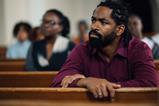Dr Belle Tindall says it’s time for the Church to stop alienating women who are not in families
You could say that I’m quite a ‘successful’ person.
I mean that in the shallowest, most 2D and ‘worldly’ of senses. I think, to be more accurate, you could say that I’ve done alright professionally (again, in a sort of narrow, worldly, 2D kind of fashion). I’m a doctor (of biblical studies, just to be clear. My doctorate is about as medically relevant as that of Friends character Ross Gellar) and a full-time writer, scholar and podcaster. Which is pretty pinch-me-worthy, I must admit. Somehow, I seem to have achieved dreams I didn’t even know I had, found myself in rooms I never would have thought possible. I guess that’s what I mean when I say I’m ‘successful’.
While my all-consuming, all-involving, all-encompassing imposter syndrome is screaming at me to delete that paragraph, it serves a purpose; it illustrates a point. Because, despite all of the above, I have never been more widely celebrated, hosted, complimented and congratulated as I was when, at the ripe old age of 28, I got myself a serious boyfriend.
Then I had actually made it. Then my life became a true success story. I had finally found myself on the right track. At least, that’s what it felt like. Marriage is regarded as the pinnacle of accomplishment – and so, the fact that I had inched closer to said accomplishment made wonderfully well-meaning people giddy. Don’t get me wrong, I love how happy people are for me, I’m happy for me too, but it did highlight just how ‘not-enough’ I had felt before. I, successful but single, wasn’t worthy of such glee.
The cultural trend away from marriage
What makes this even more interesting is the fact that fewer women are getting married now than ever before. This is largely (though not exclusively) down to women’s rise in economic circumstances in recent decades. We are, steadily, decreasing our economic reliance on men, which means that marriage is now a societal choice, not a necessity. And women are simply choosing not to get married. In 2022, the Office For National Statistics told us that – for the first time ever – less than 50 per cent of people in the UK (above the age of 16) were married. The world is simply falling out of love with the covenant, the institution and the very idea of marriage. You may consider this to be a feminist victory of epic proportions, or you may deem it to be nothing short of a social disaster. When I was first told this statistic, by a person who happened to be in the ‘terrified at our impending marriage-less doom’ camp, I had one prevailing thought: “It doesn’t feel like marriage is falling out of favour.”
It doesn’t feel like a choice, rather than a necessity.
It doesn’t feel like being un-married is no longer the lesser option.
It doesn’t feel like you can be celebrated for opting out of marriage.
It doesn’t feel like the singleness stigma has evaporated.
And that, of course, is because I go to church. You know, that wonderful, messy, beautiful, imperfect, sacred, infuriating, brilliant, marriage-obsessed thing. Researcher David Voas once succinctly said that: “it’s hardly an exaggeration to say that individuals don’t go to church, couples do”. So, come and do a read of one of these rooms, Office for National Statistics; you’ll find quite the contrary picture, I can assure you. There, marriage is still very much the flavour of the month. Of every month, actually.

Still obsessed with marriage
Lauren Windle, in her book Notes on Love (SPCK), puts it wonderfully bluntly: “Married people are the successful, most desirable ones. Single people are the less attractive pool, who will hopefully learn to settle for each other in order that everyone gets paired off. Deliberately single people are deeply suspicious and could surface in years to come as part of a sex scandal uncovered by an investigative journalist. No one’s said this from the pulpit; it’s not in your church newsletter. It’s just ingrained, dripping from every sceptical look and sympathetic glance.”
As Lauren suggests, it’s not like such a message is preached explicitly, but the subliminal message that marriage is the pinnacle of success is everywhere; it’s in the cultural air we breathe. Here are a few tangible examples that I heard from Single Friendly Church Network’s Beth Collingridge.
It’s highly probable that your church is led by someone who is married. But, what’s more, the details of their family life (how long they’ve been married, how many children they have etc) is likely to be displayed on the church’s website as part of their professional/pastoral bio. Almost as if it’s a qualification.
It’s likely that the majority of their sermon illustrations and anecdotes will be derived from their family life – something their child said or did, or an interaction they had with their spouse one time. The experience of being single, on the other hand, is barely ever spoken of.
Our churches don’t know what to do with us if we’re not paired off
Churches tend to run alongside the school calendar, which is largely irrelevant for single (non-teacher) people.
Your church may be the kind that runs ministries and courses for specific age-groups or life stages. If so, they’re likely to offer the marriage course, the pre-marriage course, a ton of kids work and perhaps even a group or two specifically for parents. But they probably don’t have anything specifically for people who have aged out of students’ ministry, but aren’t in the marriage/family category either.
Now, you may read that list and think: “Nope, I can’t relate, my church looks nothing like that.” And, if so, amazing. Genuinely, that’s a wonderful thing you’ve cultivated. But, for the majority of us, that list hits pretty close to home.
As Beth was talking me through the endless ways that single people are made to feel ‘less than’ married people, it was revelatory to the point of painful. In a hundred little (and, sometimes, not-so-little) ways, we’re told that if we’re not married, we’re the outliers, the anomalies, a problem to either be fixed, pitied or ignored. It’s like our churches don’t know what to do with us if we’re not paired off; if we don’t come as a set. Marriage is treated as a kind of levelling up process, right? A means by which we ‘make it’; a way to secure the dinner invitations and be a true asset to church life. Then, post-wedding, it seems as though the goalposts immediately move to having children – suddenly they become the next level, they become the way we prove our worth.
We make family and marriage a goal, albeit often subconsciously, ensuring that anyone who isn’t a spouse or a parent is made to feel that they’re simply waiting their turn. They’re just not there yet.
The gospel view
But, the thing is: is that a biblical concept? Is it right that we make marriage the goal? Well, in short, no. I recently scrolled past a reel of Annie F Downs that stopped me in my tracks. Annie is a world-renowned pastor, author and podcaster. Oh, and she also happens to be single. In this clip, while speaking to Sadie Robertson Huff (also a pastor, author and podcaster – who happens to be married with two daughters), Annie said this:
“The gospel goes further through my life if I’m not married…I impact the kingdom more today because I’m single. And for you (Sadie), you impact the kingdom more today because you’re married. And so, in every dating relationship that starts to fall apart, which – spoiler alert – they all have so far…it still makes me cry, it’s still very hard, it’s still all the things. But if that’s not the guy that the gospel goes further with, I don’t want him. Until that comes along, this is exactly who I want to be.”
I just love the way Annie puts this – her and Sadie have different circumstances, but there’s not a hint of hierarchy there, just an acknowledgement that God is using them in different ways. I think that’s an incredibly biblical take, lest we forget Paul’s infamous take on singleness: “I wish that all of you were as I am [single]. But each of you has your own gift from God; one has this gift [singleness], another has that [marriage]” (1 Corinthians 7:7).
To move from being single to being married is simply to swap one set of circumstances for another, one set of challenges for another, one load of joys for another. Marriage isn’t an upwards movement, it’s not a form of progression – both Paul’s and Annie’s words make that beautifully and decidedly clear. To think that someone has made it when they get married or have children is not a biblical stance. To assume that God cannot use someone who is single is not a biblical stance. To give any kind of weight to these ideas is to choose alienation over inclusion.
Disparity between the sexes
I think women tend to face the brunt of such alienation. I remember overhearing a church leader planning a seminar on the topic of dating, relationships and singleness (great idea, by the way). As he was deciding who to invite to be a part of the panel, he mentioned that he wanted a specific woman to be on it because “she knew the suffering attached with being single and having to wait longer than most to find a spouse”. She had gotten married the previous year, at the age of 27. Her husband, interestingly, was 30 when they got married – and so had technically ‘waited’ longer. Yet it was she who was considered to have faced the brutality of singleness, not him. There’s so much wrong with that. I can only go off my own experience here, along with those of the people I do life with, but men who are single tend to be treated as confident and independent; they know what they want and they simply haven’t found it yet. Maybe they never will, good for them. Single women, on the other hand, are lacking somehow. And don’t even get me started on the D-Word. Cough – desperate – cough.
To assume that God cannot use someone who is single is not a biblical stance
This isn’t just a church thing. Last year, beloved comedian and sit-com writer, Miranda Hart, penned and released a book that was ten years in the making – it was the story of her living with chronic illness and finding joy, self-worth and peace amid the suffering. She offered her readers vulnerable insights, treasures she’d found, endless research, words of comfort and wisdom. It was a significant piece of work. And all the headlines seemed to really care about was that she also included the story of her meeting, falling in love and marrying a man at the age of 51. That was her happy ending; that was her truest success.
Ugh. (I mean, I’m very happy for her – I’m just annoyed that people have identified this as the main reason for her to be so.)
It’s time for a new message
As Church, we need to be different, don’t we? I am dying for us to rip up this tired old script. I’m desperate for our reputation to be that we are radical in our inclusion and celebration, turning worldly expectations and ideas upside down. That we would be known for being at the forefront of redefining what family means, telling the world that it’s not always about the spouse, the house and the three children. It’s about being generous with our love, living wide open lives, hosting people just as they are. That the message would ring out: “if you’re looking for belonging, you will – without exception – find it here”.
I’m longing for us to challenge our own perceptions of a successful life; to start championing people who have decided to make a lifelong commitment to singleness, and retracting our right to comment on those who are hoping their singleness is a temporary season.
They’re not lacking and they’re not simply waiting their turn. Let’s quit reducing them that way.

































No comments yet